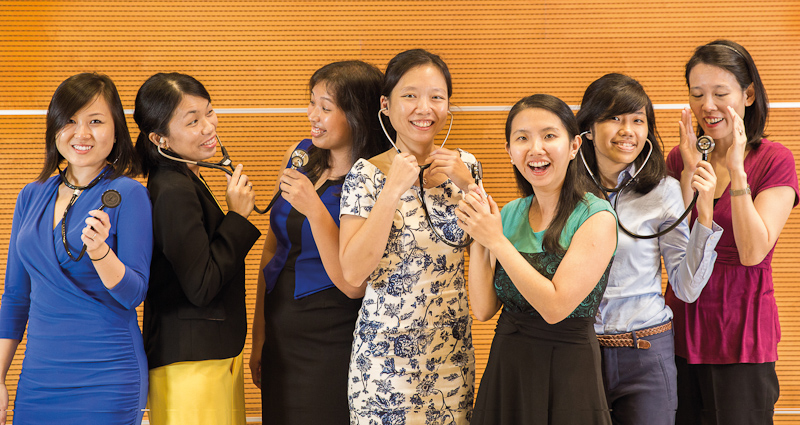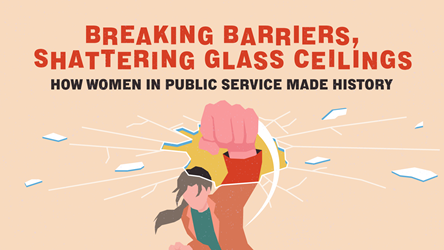Integrating Public Consultation into Public Policy

Ministry of Health (MOH) policy officer Lee Shiao Wei knew she was working on a major policy when she and a team of officers were tasked to review MediShield, the existing national healthcare insurance scheme, and propose a new one.
But what she did not foresee was the amount of work and the scale of the public consultation that would follow after the review of the new scheme, MediShield Life, was announced last year.
She found herself heading an eightmember secretariat to support an external committee. The MediShield Life Review Committee, appointed by Health Minister Gan Kim Yong, would make recommendations on the scheme, an ambitious programme to give healthcare coverage to all Singaporeans for life. The committee also sought public and expert views to “add rigour and independence” to the policymaking process.
The result was a seven-month review, which concluded in June. It consisted of 30 committee meetings and 36 focus group sessions involving 1,200 people – far more than the six meetings and 15 dialogue sessions that the policymakers had initially envisioned.
Ms Lee, Principal Finance Policy Specialist at MOH, says: “The public consultation was a very integral part of the policy planning. As late as April, two months before the [review concluded], we were still running focus group discussions and incorporating public suggestions into the committee’s recommendations on the MediShield Life scheme.”
Policy put under the spotlight
To support the committee’s work, the secretariat provided preliminary recommendations, as well as reference materials and supporting information, which they had to compile, make sense of, and summarise.
The 11 committee members – comprising financial and insurance experts, medical professionals, and labour and grassroots leaders – scrutinised data, mulled over the options and asked plenty of tough questions.
“They wanted to do a thorough review and be very sure that the recommendations were sound, so they would question all our underlying assumptions,” says Ms Lee. “We really had to work very hard to give them all the background information and [keep questioning] our own assumptions and reasoning.”
While the committee agreed with the secretariat on many points, there were many issues on which the committee challenged the secretariat to reconsider its assessment.
During the public dialogues, some people had suggested having a “no-claims bonus” for those who stayed healthy and out of the hospital. The committee asked the secretariat to consider this idea, but were eventually convinced – after being presented with data and considered reasoning – that such a bonus would increase premiums and possibly discourage people who do fall ill from seeking treatment.
Even though the sparring was gruelling, Ms Lee says it helped her team to test their arguments, consider different perspectives, and strengthen the policymaking process.
For instance, the MOH accepted the committee’s recommendations to increase claim limits and reduce co-insurance rates for better coverage.
Secretariat member Jasmin Lau, Deputy Director (Finance Policy) at MOH, feels the process is “more robust”, even though there are already systems in place to identify flaws in policy thinking. “Good bosses do that too,” she says, “but in this case, you have more people questioning you and making sure the policy is a good one.”

Engaging the public
In designing the public engagement process, the secretariat also drew from the Our Singapore Conversation (OSC) exercise, and tapped on its facilitators and notetakers.
Similar to the OSC, members of the public were divided into small groups to share their experiences, before they homed in on specific issues like universal coverage and Integrated Shield Plans (a composite of MediShield Life and private insurance plans).
As the officers sat in on the dialogues, they realised that many Singaporeans did not understand how Singapore’s healthcare financing works. “They had no clue what MediShield is, or the difference between MediShield Life and their private plans.
Without this basic understanding, they could not provide meaningful feedback on MediShield Life,” says Ms Lau.
And so the secretariat adapted the dialogue process and introduced presentations, complete with simple diagrams, to explain the different healthcare schemes to the participants.
Ms Lau, who was part of the OSC secretariat, thinks such public dialogues not only help officers have their ears to the ground, but also allow officers to experience the process of explaining policies to Singaporeans face to face.
She recalls several elderly folks going up to her after the sessions to ask questions about the policy and share their personal healthcare problems.
“As policy officers, we are usually not on the front lines of public communications,” Ms Lau says, “so it’s a test to see if we can explain the reasoning behind the policy, and have the person walk away feeling assured that his or her question was answered well.”
To ensure that the public would understand the complex MediShield Life recommendations to be announced, the secretariat first tested their communication plans with “red teams” (independent review groups) made up of public officers, dialogue facilitators and grassroots leaders. Different modes and styles of presentations were tested for effectiveness.
The red teams came back with extensive feedback. For instance, they suggested that information on premiums be shared in monthly figures instead of an annual sum, since people tend to think of their incomes by month.

Be flexible, adaptable and resilient
As policy officers become involved in various stages of policymaking, they need to be prepared to take on more roles, both officers say. Ms Lau believes the key is to be “flexible, adaptable and resilient”.
“[When] engaging the public, it is not possible to predict or control what members of the public will do, ask, or say... There’ll be days when we have to redesign our plans, or do something impromptu. This means that as managers and leaders, we have to train our officers and trust them to make quick and critical decisions in real time,” she says.
Officers also need to have mental stamina. “When we started this, I told the secretariat that we have to brace ourselves for a marathon,” Ms Lee recalls. “It was very intensive throughout and the most painful part was … just before the finalisation of the recommendations, because of the cumulative intensity over the past six months. Psychologically, it’s hard but a really worthwhile and enriching process.”
For Ms Lau, she thinks being involved in the full policy cycle will help officers think more critically – and at an earlier stage – on how their policies will impact and be received by the public.
But ultimately, she says officers need to have the courage to stand by their work and what they believe in as the best policy for the majority of Singaporeans.
“If you have tested your work enough, consulted enough, at some point, you have to decide this is as best as it can get, and just go with it.”
- POSTED ON
Sep 1, 2014
- TEXT BY
Jamie Ee
- PHOTOS BY
Norman Ng









